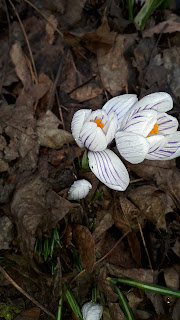I took a stroll into town, decided upon a visit to the museum. An exhibition of work created by artist Arabel Labrusan had caught my eye, but my eye is always ready to be distracted by nature and wildlife. And my eyes, and ears, were most definitely distracted.
Around the museum are gardens, where my attention was first drawn to the snowdrops (Galanthus nivalis), and then the daffodils (Narcissus pseudonarcissus); signs of coming spring. I lowered onto my haunches, trying to get a half decent picture of some flowers on my phone. The flowers are a natural reminder that everything passes, capturing their image a futile attempt at holding onto the beauty a while. Then, there are those of us that insist upon sharing that beauty, in spaces like this one.
The snowdrops stood, their perfect little white heads downward turning, looking like melancholy figures. The daffodils, by comparison, seemed happier with their open yellow faces. The trumpets, tending toward a richer and deeper yellow than the paler tepals, could have been calling out gloriously for coming spring. But, of course, that's just the romanticising anthropomorphising side of my love for nature.
After the sights, it was the sounds, the bird calls and songs, and in following them I saw that I was surrounded by activity. Blackbirds (Turdus merula) were out, collecting materials and food, a number of them present in the garden. They rootled in amongst fallen leaves, and picked at things invisible to my eye on the grass. One, a female, with her feathers earthier than the coal coloured males, had a little trouble with a piece of material she had collected. A long and stringy looking piece of plant material, longer than it seemed she had estimated, she looked to be having some difficulty managing it in her bill.
I stopped, and stood a while, just watching and listening. The Robins (Erithacus rubecula), with their cascading songs, were easy to identify, their music being so present in both town and countryside. And then, there were the tits. A Coal tit (Periparus ater) call caught my ear. Their blue and yellow relatives often visit the feeders at home, but the Coal tits I only see and hear when out in parks and woods. Its calls rang in the gardens of the museum.
In a yew tree, in branches over my head, a brilliant red face, the colour of blood or rose petals. A little song, not as loud as others in the garden, but a pleasant little twittering. A Goldfinch (Carduelis carduelis) perched, its head turning, taking in the scene. On its wings with golden-yellow bars, it flew from the evergreen to a small bare tree, and stayed briefly on a branch before taking off, and away.
Long-tailed tits (Aegithalos caudatus), a pair at least, flitted from place to place, and a grey squirrel (Sciurus carolinensis) sat in a fig tree. Every feathered and furred life was out, busy in search of food and materials, the season for breeding almost here. The Goldfinch returned to the yew tree, something in its bill. When I saw another Goldfinch in the tree, I fancied that they were building their nest, setting up a home for imminent spring.
The various chirps, twitters, and pit-chu calls and songs carried on the air. From treetops and shrubbery, from the Blackbirds rootling around in leaves and other plant matter, tossing unwanted things aside, the sounds of nature and wildlife. People walked about. But, for a little while, the lives of these little birds seemed so much more interesting. As did the only briefly present flowers. I was lost in the purity of it all.
I didn't get into the museum, so lost I was in the birds and flowers. Nature and wildlife are like alien abductions; you can get taken away by them, and return having lost time without realising. Still, I suspect that visits to nature are more pleasant than the abductions. And much easier to believe in too.
I don't mind getting lost in nature, in parks and gardens and woodland, and I don't mind being distracted by the sights and sounds of wildlife. Sometimes even the smells. In fact, I hope that for a long time yet I am still lost and distracted, because when I am not I will have lost something pure. Something not influenced by practical day-to-day desire and needs, something that was there in childhood, and which has run like a thread through my life into adulthood. The thing that inspired Wordsworth. Yes, I hope that I am easily distracted a long time yet.
Thank you for reading. Before you go, can I ask that you consider supporting this blog with a coffee from ko-fi.com - the caffeine does, sometimes, get me where I mean to go!
I resist allowing ad space in this blog, preferring to generate greater things than sales in this place. Or, at least, hoping to generate greater things. But, with writerly ambitions, I seek support for my writing by throwing myself on the kindness of readers.
If you are able to do so, take a look at ko-fi.com - the price of a coffee can be a boost. And, I thank you, every reader and supporter!





No comments:
Post a Comment